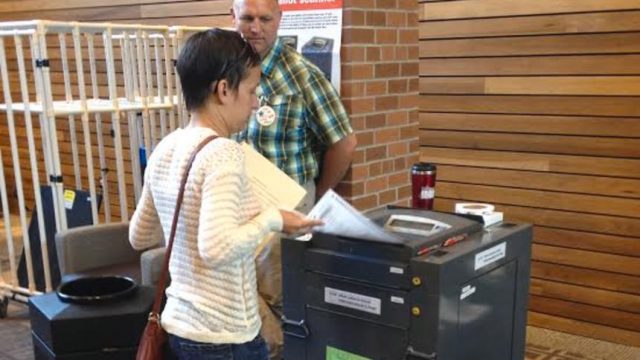Democrats Shouldn’t Get to Help Pick Republican Nominees (And Vice Versa)

In the wake of Doug Burgum’s stunning primary day upset last week there has been a lot of work put in by newspaper columnist and politicos to downplay the significance of Democrats voting for Burgum on the Republican ticket.
I can agree that these crossover voters didn’t give Burgum the victory. But even members of Burgum’s campaign I’ve spoken to acknowledge that the crossovers were the reason why their candidate won in a landslide.
The crossover vote changed the perception of Burgum’s victory. Had Burgum’s margin of victory been narrower he’d have less of a political mandate. That’s significant. It will impact how the rest of this political cycle, and probably the tone of Burgum’s first term in office (assuming he survives the general election competition against Democrat Marvin Nelson).
So when I hear people argue – as Grand Forks Herald publisher Korrie Wenzel does in an editorial today – that there is no need to reform North Dakota’s voter registration laws because the crossover vote isn’t the reason why Burgum won I roll my eyes.
[mks_pullquote align=”right” width=”300″ size=”24″ bg_color=”#ffffff” txt_color=”#000000″]The anti-gun Brady Campaign doesn’t get a say in who the leader of the National Rifle Association is. The Red Sox don’t get to choose the starting pitcher for the New York Yankees. The Bismarck Tribune doesn’t get to pick the publisher of the Grand Forks Herald. So why should Democratic voters get a say in who the Republican nominee is?[/mks_pullquote]
Crossovers are probably not why Burgum won. He probably won with Republicans. That’s a good thing (and perhaps something for liberals gloating about his victory to keep in mind).
But none of that matters when we’re talking about who should get to vote in the Republican primary.
Here’s something a lot of people seem to be forgetting: The June vote was not a general election vote. It was a primary, with the votes cast choosing the respective nominees for the political parties on the ballot. In North Dakota that’s the Republicans, the Democrats, and the Libertarians.
These political parties are private organizations, and I’m not sure why anyone would think it’s reasonable for the members of one private organization to pick the candidates representing a rival party.
The anti-gun Brady Campaign doesn’t say in who the leader of the National Rifle Association is. The Red Sox don’t get to choose the starting pitcher for the New York Yankees. The Bismarck Tribune doesn’t get to pick the publisher of the Grand Forks Herald. So why should Democratic voters get a say in who the Republican nominee?
Which isn’t to say that people can’t switch parties as it pleases them. Only that Republicans (and Democrats and Libertarians, etc., etc.) should have some degree of certainty that their candidates will be chosen by members of their own party and not members of other political parties getting up to mischief.
To illustrate the point, I’ll let you in on a gag I was talking about with some political friends earlier this year when it looked likely that the Democrats would fail to find candidates for some of the statewide ballot slots. I said that I should gather the requisite 300 signatures and put myself on the Democratic ballot for, say, state Auditor.
Running unopposed I’d have been almost guaranteed to advance to the general election ballot (I only needed only a minimum of 300 votes), and the Democrats would have been stuck with outspoken conservative blogger Rob Port on their slate of candidates.
Do you think that would have been fair to Democrats? Of course not. But the law allows for that sort of nonsense, and it shouldn’t.
None of this is to impute any illegitimacy to Doug Burgum’s victory last week. He won, fair and square, and I hope he will be as conservative a governor as he was a candidate.
I’ll also point out that my opposition to the open primary predates Burgum’s victory. This isn’t about Burgum. I’ve been writing about this for a while.
We need to reform the primary process.
I’m open to suggestions on how we can accomplish that. It would be nice if political parties were simply allowed to choose their own candidates by whatever means the parties themselves establish, but if we’re going to insist on a primary vote then something like voter registration (for which there are inklings of bi-partisan support) would be necessary.




